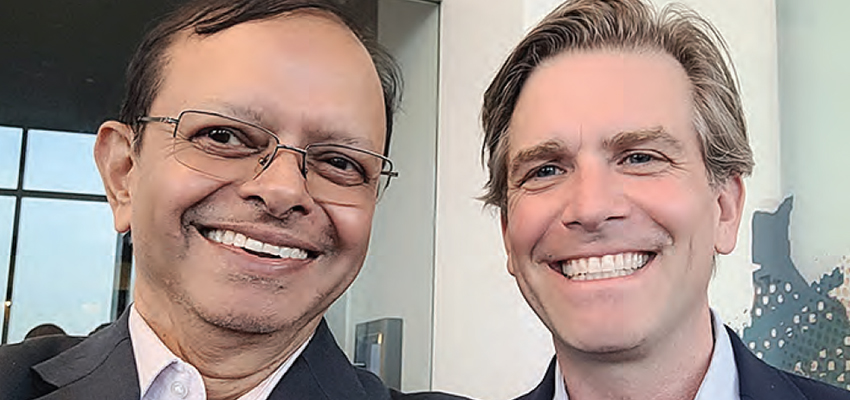New frontiers of collaboration

The new saying is “Artificial Intelligence is no antidote for Human Stupidity.” Let us look forward to more intelligent actions to make the world a better place
The last few weeks have been a voyage of discovery for me, thanks to both a punishing and rewarding travel schedule and also a series of interactions with industry professionals, academicians and students at IIT Bombay, IIM Ahmedabad, George Washington University and Berkeley as we did a series of events around our new book “India’s Pathways to Success.” So many new ideas are emerging, unusual partnerships evolving and innovations sprouting all over the world that it would need another book to do justice to them.
Let us look at the new world through three lenses – emerging technologies, changing geo- politics and evolving aspirations. In every academic institution there are discussions happening around Generative Artificial Intelligence and ChatGPT and the views move from one extreme to the other, with the luddites believing this is just another passing fad and the Cassandras of doom worrying that the age of the smart machine will eliminate all forms of human livelihood.
What is needed is a clear understanding of the evolving potential of artificial intelligence and as we discussed at a recent advisory board meeting, the onus will be on academicians to evolve their teaching and questioning to a level that students will have to think deeply rather than just recirculate an existing body of knowledge in different formats.
Other technologies like immersive virtual and augmented reality, predictive and prescriptive analytics and machine learning will further augment human learning and capabilities and enable multi-disciplinary, multi-location and man-machine collaboration at scale. Technology will indeed drive us all – researchers, academicians, businessmen, politicians and the common man to think of new uses of our time and resources and it is imperative to ensure that the uses of technology enhance the value of mankind at all times.
The change in geo-political realities was a topic of discussion in all our meetings – in India, Philippines, Singapore and Washington DC at book discussions, board meetings and open houses.
With the appointment of a new Chinese Prime Minister, a revival of growth in their economy and the aggressive reaching out to Russia and the rest of the Association of South East Asian Nations (ASEAN) in bilateral conversations, the competition between China and the rest of the world on global supremacy is well and truly back.
The question that is uppermost in all minds is will the West, used to getting cheap supplies from China be willing to actually reduce China’s access to their markets or will it just be a question of all bluster and less action on the ground. The wily dragon will not be denied easily, and India too must get its economic and diplomatic act well in place to get and continue to occupy a seat at the high table for all conversations on the economy, military alliances and climate change. A truly multi-polar world is beginning to emerge, and every country needs to participate in a collaborative manner to get the best deal for their own countrymen.
The third lens is arguably the most critical, which is the aspiration of youth everywhere in the world, most of all India. As young activists like Greta Thunberg and Malala Yousufzai have asked in the past, are we doing enough to keep the world safe and the economy vibrant to provide safe living and substantial entrepreneurial and employment opportunities for future generations. One of our participants at the Washington DC book session hosted by the HBS Club of DC, The Indus Entrepreneurs (TiE) DC and the George Washington University, Jamie McAuliffe of Aspen Institute has been championing the Global Opportunity Youth Network globally with great energy and success in all parts of the world. Jamie and his team believe that solutions for youth have to be conceptualised, designed and implemented by youth with youth and for youth. We have seen in our own implementations in Pune, Delhi and Bhubaneswar, the dreams of youth growing up in the slums are as important to understand and realise as any of the more affluent class.
Our own country is sitting on a tenuous advantage called the demographic dividend and having surpassed China recently in the size of population, we owe it to tens of millions of emerging livelihood seekers to grow the economy in multiple sectors at a rapid clip and ensure there is no dream left behind.
What is clearly emerging as a compulsion – for the USA, Europe, ASEAN, and of course India is the envisioning of a new future for mankind. The “flat world” of Tom Friedman cannot be realised in the near future with the divisiveness that has emerged after Ukraine and the chest thumping on Taiwan. There are deep chasms of distrust and discord between most significant nations of the world.
In our past two books, on China and India, we have argued for engagement rather than conflict and in an environment when tempers get raised between communities and countries at the smallest provocation, it will need many soothing tones and healing hands to build a more inclusive world. The new saying is “Artificial Intelligence is no antidote for Human Stupidity.” Let us look forward to more intelligent actions to make the world a better place!